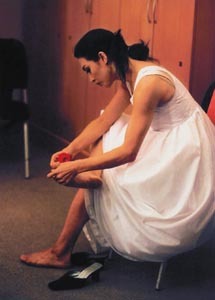Rows of black suits filled the China Airlines flight from Beijing to Paris in September 1984. The People’s Liberation Army had ordered its entire delegation of dancers and musicians to wear the same ill-fitting outfit. Only one 17-year-old dancer had disobeyed the order. For this, his first visit to Europe, Jin Xing had bought a dazzling, white three-piece suit. ‘Only I shone out,’ he declared proudly.
It is this desire to shine against the bulwark of the Chinese state that defines Jin Xing’s autobiography, Shanghai Tango. It has been no easy feat. Jin Xing was born a boy and became a colonel in the People’s Liberation Army. A sex change saw her start a new career as an international ballerina, choreographer and, most improbably of all, Beijing bar owner.
Her perspective is unusual and not just for the sex change. Here is an individual uncertain about his sexuality, but never his drive and ambition, who lives in a communist state that at best distrusts individuality, and at worst destroys it. Shanghai Tango is a fascinating insight into the changes in China over the past 40 years through its relationship with one extraordinary person. The danger is never far absent. Jin Xing’s earliest memories are of wanting to wear a tutu — and of his mother being interrogated night after night by the Red Guards.
Jin Xing grew up in a state where art could only exist as propaganda. The People’s Liberation Army ran the best dance company in order ‘to inspire its soldiers’. Entry into this ‘socialist dancing machine’ was not for the faint-hearted. At the age of nine Jin Xing saw his family no more than three times a year, learnt to use a gun, go on army manoeuvres and undertake a dance training verging on the sadistic. He recalled standing with one leg above his head tied to a pillar and attached to a pulley, ‘until we were doing the vertical splits’. The dancers held the position ‘until the ligaments started to rip’. This took place every morning for an hour, the screams from the cadets making the gym sound ‘like a slaughter house’.
Through blackmail, luck and sheer determination Jin Xing won a dance scholarship to the States. Here the hardest thing for him to learn is not technique — virtuosity is all-important in China — but freedom of expression. In Chinese dance, he explains, ‘there is no room for human sensibilities’. In New York he learnt to infuse every gesture with emotion and to dance as an individual.
Today Jin Xing’s status in communist China is equivocal. Despite international success, she had to fight in order to stage Carmina Burana in Shanghai recently. ‘I serve both as advertisement and an alibi for the party,’ she explained wryly in an interview for Der Spiegel. When party officials are attacked on human rights or Tibet, they point to Jin Xing, the trans-sexual colonel, ‘whom we allowed to obtain a sex change and who now performs as a prima ballerina.’ Thus does the machine deal with the individual in today’s China.
Jin Xing, whether male or female, is obviously equally charismatic. The book is full of sexual escapades, from masturbation on army manoeuvres to domesticity with an American cowboy. In the end the sex change is almost irrelevant. What shines through is the personality of Jin Xing and her battle to lead the life she wants in communist China.






Comments